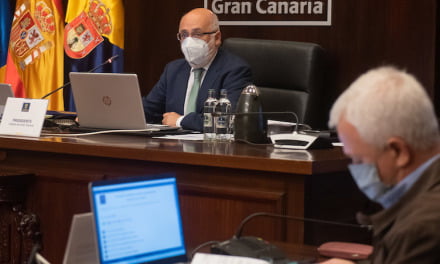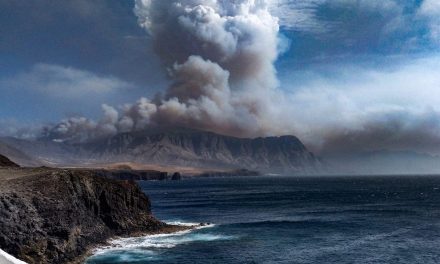Spain is the country with the highest number of Monkeypox cases in Europe, and the Ministry of Health has confirmed thirty cases so far, all of them in Madrid. The majority of cases detected have been men who have had sex with other men, however it is very important to understand that this virus is in no way based around sexual orientation or so-called “risky” practices. The simple fact is that this is an infection that can be passed between any individuals who come into close contact with each other or infected material. It is very important that misinformation is dealt with appropriately, and that community leaders step forward to ensure accurate advice is available for all.
Spanish national, El País, this Saturday published an article pointing to the Canary Islands Public Health services investigation into whether the recent Pride, held between May 5 and 15 on the south of Gran Canaria, may have been a focus of this outbreak – though, right now, the primary outbreak in Spain centres around a sauna in the Madrid neighbourhood of Malasaña, which was closed on Friday by the health authorities. The Pride event, which has been organised on the island for more than 20 years and focused on the famous Yumbo Centre in Playa del Inglés, was reportedly attended by up to 80,000 people of different nationalities, although the current event organisers did announce numbers attending of more than double that; a more measured estimate from tourism federation bosses, FEHT, have placed the number of people participating at more likely around 25,000 to 30,000 people or less. El País states that several of the cases detected in Madrid were also at Pride here on the island, as is the case with cases found in Italy too.
 Several other publications around the world have also picked up on the story, some of them unhelpfully using inaccurate terms like “super-spreader” to overly sensationalise what is currently unknown or being looked into. The commercial organisation behind this years events, who took the event away from Maspalomas Pride Gran Canaria’s original community founders back in 2016, have so far made no public statements whatsoever regarding the current situation. In fact there has been very little from them at all this year, it is hoped there will be some guidance as the facts become clearer. In the meanwhile other community leaders and social media groups are being left to try to manage what little information is available.
Several other publications around the world have also picked up on the story, some of them unhelpfully using inaccurate terms like “super-spreader” to overly sensationalise what is currently unknown or being looked into. The commercial organisation behind this years events, who took the event away from Maspalomas Pride Gran Canaria’s original community founders back in 2016, have so far made no public statements whatsoever regarding the current situation. In fact there has been very little from them at all this year, it is hoped there will be some guidance as the facts become clearer. In the meanwhile other community leaders and social media groups are being left to try to manage what little information is available.
What is key, is that we all, here, take some responsibility for defending accurate truth, and Gran Canaria’s position as one of the oldest and most mature destinations in the world. Maspalomas, in particular, has long promoted equality and visibility for a global community who repeatedly choose this island as one of their favourite places to visit. As Europe’s only sub-tropical pride destination, we have a long and illustrious history defending liberty and love-positive attitudes. Liberty does not mean freedom from responsibility, it means freedom from stigma and misinformation, and freedom from discrimination. Timon .:.
There are currently two possible cases under investigation in the Archipelago, one on Gran Canaria and the other on Tenerife. The Regional Health Department have confirmed that only one of these is linked to the event hosted in Maspalomas. “It is possible” say sources within the Ministry, “that the event has contributed to the transmission of the virus, but it is still too early to know the weight it has had, or to be able to confirm this information. The important thing is that people with compatible symptoms call 112 to be treated early and properly”.
General director of Public Health for the Canary Islands Health Service (SCS), José Juan Alemán, has said that, right now, “the priority is to find all the potential sources of contagion” and obtain information from the greatest number of sources to be able to establish an origin. “It is evident that, as happens with any other massive event, Maspalomas Pride [could be] a breeding ground for contagious diseases. Knowing the particularities of this outbreak and of the encounter itself, it is to be expected that it has helped the transmission of the pathology, but we still do not know to what extent,” he added.
He also wanted to emphasise the importance of not stigmatising any particular group. “One of the characteristics of these outbreaks is that they are being registered within groups of people who have risky sexual practices, which may help limit the transmission chains as they are not occurring among the general population” the general director of Public Health pointed out. “What we cannot allow is that any group be stigmatised. In addition, it must be clear that it is not a sexually transmitted disease , since it can be spread in several ways,” he added.
The suspected cases, reported in the Archipelago, are being analysed at the National Centre for Microbiology, Alemán confirmed, saying that he expected initial results this weekend, or by Monday morning. “Both present all the characteristic symptoms of the disease, and meet the clinical and epidemiological criteria, so it is very likely that they will be confirmed. Fortunately, the patients are showing a good evolution and are being monitored at home”, he added.
According to the Ministry, it is the responsibility of the general directorates of Public Health in each of Spain’s autonomous communities to investigate any cases that are detected in their region and also share with the Centre for the Coordination of Health Alerts and Emergencies (CCAES) any epidemiological information related to close contacts that may be outside its territory. “At the national level, one of the peculiarities of the study of close contacts is the difficulty of traceability, since a significant number of people cannot be located because the subjects do not know their identity, or because they do not want to identify them.”, noted José Juan Alemán.
It should be noted, reports Spanish language daily La Provincia, that a Professor of Animal Health at the University of Las Palmas de Gran Canaria (ULPGC), José Poveda, who is also a researcher at the University Institute of Animal Health and Food Safety (IUSA), a few days ago posted, on his Twitter feed, that Maspalomas pride could have been a starting point for the current contagion of monkeypox. “I suspected that some of the subjects who tested positive in Madrid had been on Gran Canaria. Indeed, this was the case and more will continue to be registered because the incubation period can reach up to three weeks,” said the expert, who did not hesitate to highlight that it is a circumstantial episode.
“The first cases could [just as easily] have been declared among the heterosexual population, since contagion occurs through direct contact with infected material” Poveda stressed.
La posibilidad que el evento celebrado en Maspalomas el 14 de mayo pueda haber sido un foco de contagio del virus de viruela del mono ya lo había apuntado yo en este tuit! https://t.co/L4tmkjR5IH
— Jose Poveda (@PovedaJB) May 21, 2022
Dr. Poveda states that the pathology is caused by a DNA virus that is very resistant in the external environment, but its transmission capacity is low.
“The main source of infection is through contact with the pustules that appear on the body and, to a lesser extent, through the airways. Now infections have arisen from having had sexual relations with those affected, but this is the first time that that has happened” said the Veterinary Microbiology professor.
The professor, who also has a PHD in Epidemiology, Preventive Medicine and Exotic Diseases, explained that, until 1980, this pathology had only appeared sporadically in Africa, because until that year smallpox was still being vaccinated against, using the vaccinia virus -of bovine origin-, with which smallpox was eradicated. “Its existence was discovered in 1958, but at that time many were vaccinated and so subjects in Africa did not suffer from the disease as a result of monkeypox. From 1980, as a result of suspending inoculations, cases began to be seen in the new non-immunised generations. Since then, we have tracked,” said the professor, who also reports that 558 clinical cases were registered in Nigeria last year.
There are two types of monkeypox virus. One of them has a mortality rate of 1%, while the other has a rate of 10% . “In this case, the pathogen that is circulating is the one with the lowest mortality rate. Fortunately, the infection evolves favourably in most cases, and any injuries it causes are usually mild or moderate. The pathology usually remits after about three weeks, but everything depends on the immune status of the subjects and the infective dose, or viral load. “There are people in whom the microorganism spreads more easily and they develop pustules all over their body. In fact, the infection can be systemic and lead to death if it is not treated with antivirals,” said Poveda. In addition to skin lesions, other common symptoms are muscle aches and headaches, tiredness or the appearance of lymphadenopathy (swollen lymph nodes) and fever.
The head of the Spanish Association of Vaccinology, epidemiologist and immunologist Amós García Rojas, pointed out through his twitter feed, starting as ever with his trade mark phrase “Calm and patience: + Prudence How tremendous it is that in certain forums they try to assimilate health problems with each person’s sexuality. It happened with HIV, and some repeat it with this Monkeypox. Well, no. It is not a disease of [sexuality], it is of everyone. Let’s stop stigmatising”
Calma y paciencia:+Prudencia Que tremendo resulta que en determinados foros se trate de asimilar problemas de salud con la sexualidad de cada cual. Pasó con el VIH,y algunos lo repiten con esta Viruela del Mono.Pues no. No es una enfermedad de,es de todos. Dejemos de estigmatizar — Amós García Rojas (@agarroj) May 22, 2022
What would happen if uncontrolled community transmission occurred?
In José Poveda’s opinion, it would be necessary to resort to the smallpox vaccine . “You have to take advantage of the low transmissibility, so if the subjects are well informed and the doctors diagnose quickly, it will be possible to extinguish these outbreaks. Otherwise, the entire population that has not had access to this protection would have to be vaccinated.”
The Ministry of Health already has an action protocol in place that includes the recommendations of international organisations to guarantee early diagnosis and the carrying out of appropriate measures.













